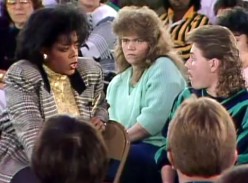Arts & Entertainment
Oprah’s gayest shows
Talk show legend never shied from LGBT topics. Her last episode aired on Wednesday.


Oprah, even in her early years, never shied from LGBT topics on her eponymous show, which ended its run this week. (Photo courtesy of Harpo Productions)
Everybody knows Oprah ended her eponymous talk show this week, but one thing missed in the mainstream hoopla was how often and unabashedly she dealt with LGBT topics during her 25-year run.
Oprah and her flock have consistently denied speculation that she herself may be gay. Gay OWN talk show host Brad Lamm told the Blade in March the question has lingered so long he finds it “offensive.” Winfrey confessed frustration over the issue to Barbara Walters in a 2010 interview because its persistence, she said, implied dishonesty on her part.
A look back through the topics of the show’s 4,561 episodes reveals a bounty of LGBT guests, perhaps none more memorable than a 1987 landmark episode that found Oprah visiting Williamson, W.Va. (population: 5,600) to interview Mike Sisco, a gay man who’d contracted AIDS while living in Dallas and who’d returned home to his family in West Virginia.
Word had spread in the small town that Sisco had AIDS and hysteria ensued when he went swimming in a public swimming pool. Sisco told Oprah residents were fleeing “like people do in those science fiction movies when they see Godzilla in the street or something.” The mayor closed the pool and Sisco was ostracized.

Oprah interviews the late Mike Sisco in his hometown of Williamson, W.Va., in 1987. Sisco, who was gay and had AIDS, caused hysteria by swimming in a public pool. (Photo courtesy of Harpo Productions)
It was the height of AIDS hysteria when confusion about how the disease could be contracted was at its peak. Sisco said he agreed to do the show to help educate the public. Rumors were running rampant in the town that Sisco had been seen spitting on food at the local McDonald’s and on produce at a grocery store.
“Mike Sisco’s story is heartbreaking because it shows the reactions/actions of human beings when fear takes hold, when ignorance is abundant and when there is a mob mentality,” blogger Lola Nicole wrote. “[He] went to be with his family so they could care for him, so he could feel loved. He got exactly the opposite.”
Last September, as Oprah started her final season, she visited Sisco’s three sisters, Patricia, Tina and Anna. Sisco died in 1996 and controversy surrounded him until the bitter end — a family fight ensued about where he could be buried. In the ensuing years, his sister Anna had come out as a lesbian.
Oprah also interviewed several of the residents who’d been against Sisco’s presence in the original episode. Some said they’d wished they’d been more compassionate.
Oprah said her goal in doing both episodes was to remind people to be compassionate.
“I think that is the complete message of this whole series we did here today and 23 years ago,” she said at a press conference after the 2010 episode. “I understand people’s fear because in 1987 we still didn’t know everything and it’s understandable that people would have questions and what was represented here in Williamson really was a microcosm for the country. We used Williamson as a symbol for what was going on in the rest of the country.”
Other famous LGBT-related episodes include:
- Gay pianist Liberace made his final public appearance on the show on a Christmas Day episode in 1986. He died about six weeks later of AIDS-related complications.
- Ellen DeGeneres came out on a 1997 episode. Oprah also appeared on her sitcom as her therapist.
- A 2003 episode that had run without incident initially, was rerun in 2005 and caused a major controversy because a guest gave an explanation of rimming, albeit in a hetero context.
- A landmark 2004 episode called “A Secret Sex World: Living on the Down Low” brought the largely black phenomenon of married men having sex with men on the side to light. It became part of the national lexicon.
- Last November, singer Ricky Martin discussed being a gay father.
- In March, “Family Ties” actress Meredith Baxter discussed being a lesbian.
- A January episode was devoted to coming out.
- In May, 2008, Oprah interviewed Cher and Tina Turner at Caesar’s Palace in Las Vegas. Oprah idol Diana Ross also made a handful of appearances on the show.
- An October 2006 episode was called “Wives Confess They are Gay.”
- A March, 2009 episode was called “Women Leaving Men for Other Women.”
- The “Will & Grace” cast convened in May 2006 for a farewell episode.
- In July, 2010 former high school football quarterback Kimberly Reed discussed her late ‘90s sex change. Her documentary was shown at Reel Affirmations.
- And just weeks ago, Oprah interviewed Chaz Bono about his transition and new documentary and book.

Friday, January 9
Women in Their Twenties and Thirties will be at 8 p.m. on Zoom. This is a social discussion group for queer women in the Washington, D.C. area. For more details, visit Facebook.
“Backbone Comedy” will be at 8 p.m. at As You Are. Backbone Comedy is a queer-run fundraiser comedy show at As You Are Bar DC, where comics stand up for a cause. Each show, a percentage of proceeds go to a local organization – Free Minds DC, a reentry organization for individuals impacted by incarceration. Tickets cost $19.98 and are available on Eventbrite.
Saturday, January 10
Go Gay DC will host “LGBTQ+ Community Brunch” at 11 a.m. at Freddie’s Beach Bar & Restaurant. This fun weekly event brings the DMV area LGBTQ+ community, including allies, together for delicious food and conversation. Attendance is free and more details are available on Eventbrite.
Monday, January 12
“Center Aging: Monday Coffee Klatch” will be at 10 a.m. on Zoom. This is a social hour for older LGBTQ+ adults. Guests are encouraged to bring a beverage of choice. For more information, contact Adam ([email protected]).
Genderqueer DC will be at 7 p.m. on Zoom. This is a support group for people who identify outside of the gender binary, whether you’re bigender, agender, genderfluid, or just know that you’re not 100% cis. For more details, visit genderqueerdc.org or Facebook.
Tuesday, January 13
Coming Out Discussion Group will be at 7 p.m. on Zoom. This is a safe space to share experiences about coming out and discuss topics as it relates to doing so — by sharing struggles and victories the group allows those newly coming out and who have been out for a while to learn from others. For more details, visit the group’s Facebook.
Trans Discussion Group will be at 7 p.m. on Zoom. This group is intended to provide an emotionally and physically safe space for trans people and those who may be questioning their gender identity/expression to join together in community and learn from one another. For more details, email [email protected].
Wednesday, January 14
Job Club will be at 6 p.m. on Zoom upon request. This is a weekly job support program to help job entrants and seekers, including the long-term unemployed, improve self-confidence, motivation, resilience and productivity for effective job searches and networking — allowing participants to move away from being merely “applicants” toward being “candidates.” For more information, email [email protected] or visit thedccenter.org/careers.
The DC Center for the LGBT Community will partner with House of Ruth to host “Art & Conversation” at 3 p.m. at 1827 Wiltberger St., N.W. This free workshop will involve two hours of art making, conversation, and community. Guests will explore elements of healthy relationships with a community-centered art activity. This workshop involves paint, so please dress accordingly. All materials will be provided. For more details, email [email protected].
Thursday, January 15
The DC Center’s Fresh Produce Program will be held all day at the DC Center for the LGBT Community. People will be informed on Wednesday at 5 p.m. if they are picked to receive a produce box. No proof of residency or income is required. For more information, email [email protected] or call 202-682-2245.
Virtual Yoga Class will be at 7 p.m. on Zoom. This free weekly class is a combination of yoga, breathwork and meditation that allows LGBTQ+ community members to continue their healing journey with somatic and mindfulness practices. For more details, visit the DC Center’s website.
Movies
‘Hedda’ brings queer visibility to Golden Globes
Tessa Thompson up for Best Actress for new take on Ibsen classic

The 83rd annual Golden Globes awards are set for Sunday (CBS, 8 p.m. EST). One of the many bright spots this awards season is “Hedda,” a unique LGBTQ version of the classic Henrik Ibsen story, “Hedda Gabler,” starring powerhouses Nina Hoss, Tessa Thompson and Imogen Poots. A modern reinterpretation of a timeless story, the film and its cast have already received several nominations this awards season, including a Globes nod for Best Actress for Thompson.
Writer/director Nia DaCosta was fascinated by Ibsen’s play and the enigmatic character of the deeply complex Hedda, who in the original, is stuck in a marriage she doesn’t want, and still is drawn to her former lover, Eilert.
But in DaCosta’s adaptation, there’s a fundamental difference: Eilert is being played by Hoss, and is now named Eileen.
“That name change adds this element of queerness to the story as well,” said DaCosta at a recent Golden Globes press event. “And although some people read the original play as Hedda being queer, which I find interesting, which I didn’t necessarily…it was a side effect in my movie that everyone was queer once I changed Eilert to a woman.”
She added: “But it still, for me, stayed true to the original because I was staying true to all the themes and the feelings and the sort of muckiness that I love so much about the original work.”
Thompson, who is bisexual, enjoyed playing this new version of Hedda, noting that the queer love storyline gave the film “a whole lot of knockoff effects.”
“But I think more than that, I think fundamentally something that it does is give Hedda a real foil. Another woman who’s in the world who’s making very different choices. And I think this is a film that wants to explore that piece more than Ibsen’s.”
DaCosta making it a queer story “made that kind of jump off the page and get under my skin in a way that felt really immediate,” Thompson acknowledged.
“It wants to explore sort of pathways to personhood and gaining sort of agency over one’s life. In the original piece, you have Hedda saying, ‘for once, I want to be in control of a man’s destiny,’” said Thompson.
“And I think in our piece, you see a woman struggling with trying to be in control of her own. And I thought that sort of mind, what is in the original material, but made it just, for me, make sense as a modern woman now.”
It is because of Hedda’s jealousy and envy of Eileen and her new girlfriend (Poots) that we see the character make impulsive moves.
“I think to a modern sensibility, the idea of a woman being quite jealous of another woman and acting out on that is really something that there’s not a lot of patience or grace for that in the world that we live in now,” said Thompson.
“Which I appreciate. But I do think there is something really generative. What I discovered with playing Hedda is, if it’s not left unchecked, there’s something very generative about feelings like envy and jealousy, because they point us in the direction of self. They help us understand the kind of lives that we want to live.”
Hoss actually played Hedda on stage in Berlin for several years previously.
“When I read the script, I was so surprised and mesmerized by what this decision did that there’s an Eileen instead of an Ejlert Lovborg,” said Hoss. “I was so drawn to this woman immediately.”
The deep love that is still there between Hedda and Eileen was immediately evident, as soon as the characters meet onscreen.
“If she is able to have this emotion with Eileen’s eyes, I think she isn’t yet because she doesn’t want to be vulnerable,” said Hoss. “So she doesn’t allow herself to feel that because then she could get hurt. And that’s something Eileen never got through to. So that’s the deep sadness within Eileen that she couldn’t make her feel the love, but at least these two when they meet, you feel like, ‘Oh my God, it’s not yet done with those two.’’’
Onscreen and offscreen, Thompson and Hoss loved working with each other.
“She did such great, strong choices…I looked at her transforming, which was somewhat mesmerizing, and she was really dangerous,” Hoss enthused. “It’s like when she was Hedda, I was a little bit like, but on the other hand, of course, fascinated. And that’s the thing that these humans have that are slightly dangerous. They’re also very fascinating.”
Hoss said that’s what drew Eileen to Hedda.
“I think both women want to change each other, but actually how they are is what attracts them to each other. And they’re very complimentary in that sense. So they would make up a great couple, I would believe. But the way they are right now, they’re just not good for each other. So in a way, that’s what we were talking about. I think we thought, ‘well, the background story must have been something like a chaotic, wonderful, just exploring for the first time, being in love, being out of society, doing something slightly dangerous, hidden, and then not so hidden because they would enter the Bohemian world where it was kind of okay to be queer and to celebrate yourself and to explore it.’”
But up to a certain point, because Eileen started working and was really after, ‘This is what I want to do. I want to publish, I want to become someone in the academic world,’” noted Hoss.
Poots has had her hands full playing Eileen’s love interest as she also starred in the complicated drama, “The Chronology of Water” (based on the memoir by Lydia Yuknavitch and directed by queer actress Kristen Stewart).
“Because the character in ‘Hedda’ is the only person in that triptych of women who’s acting on her impulses, despite the fact she’s incredibly, seemingly fragile, she’s the only one who has the ability to move through cowardice,” Poots acknowledged. “And that’s an interesting thing.”
Arts & Entertainment
2026 Most Eligible LGBTQ Singles nominations
We are looking for the most eligible LGBTQ singles in the Washington, D.C. region.

Are you or a friend looking to find a little love in 2026? We are looking for the most eligible LGBTQ singles in the Washington, D.C. region. Nominate you or your friends until January 23rd using the form below or by clicking HERE.
Our most eligible singles will be announced online in February. View our 2025 singles HERE.
-

 National4 days ago
National4 days agoWhat to watch for in 2026: midterms, Supreme Court, and more
-

 District of Columbia5 days ago
District of Columbia5 days agoTwo pioneering gay journalists to speak at Thursday event
-

 Colombia4 days ago
Colombia4 days agoBlade travels to Colombia after U.S. forces seize Maduro in Venezuela
-

 a&e features5 days ago
a&e features5 days agoQueer highlights of the 2026 Critics Choice Awards: Aunt Gladys, that ‘Heated Rivalry’ shoutout and more

















